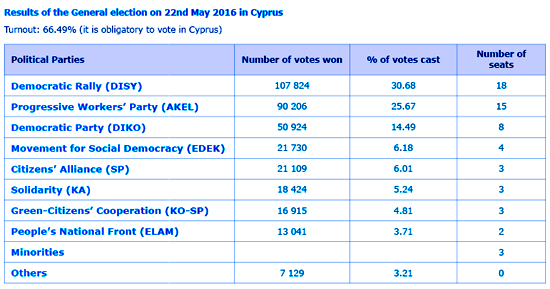Results
News
Corinne Deloy
-

Available versions :
EN

Corinne Deloy
The Democratic Rally (DISY) the party of President of the Republic Nicos Anastasiades, won in the general elections that took place in Cyprus on 22nd May with 30.68% of the vote and 18 seats (two less in comparison with the previous election on 22nd May 2011). He drew ahead of the Progressive Workers' Party (AKEL) led by Andros Kyprianou, which won 25.67% of the vote and 15 seats (four less). The communists were discredited because of the way they managed the economic crisis when they were in office (2008-2013).
The Democratic Party (DIKO), centre-left, led by Nikolas Papadopoulos, came third in the election with 14.49% of the vote and 8 seats (1 less) ahead of the Movement for Social Democracy (EDEK) of Marinos Sizopoulos, who won 6.18% of the vote and four seats (- 1).
Four "small" parties will also be represented in the next Vouli antiprosopon (House of Representatives), the only house in the Cypriot parliament, which will therefore be particularly fragmented: the Citizens' Alliance (SP) which won 6.01% of the vote and three seats; Solidarity (KA) which won 5.24% of the vote and three seats; the Green-Citizens' Cooperation Party (KO-SP) 4.81% of the vote and three seats. Finally for the first time since the island's independence in 1960 a nationalist party, the People's National Front (ELAM) will be making its debut in parliament with 3.71% of the vote and 2 seats. The Mediterranean island is therefore now affected by the populist wave that is unfolding in Europe.
Whilst it is obligatory to vote in the country in Cyprus turnout this time was by far the lowest ever recorded totalling 66.49% i.e. 12.21 points less than in the previous general elections on 22nd May 2011. "Frustration with the elites and the feeling that the general elections do not really mean anything might lead to low turnout," indicated Hubert Faustmann, professor of history and political science at the University of Nicosia, before the vote. "I am asking that everyone undertake his right to choose a party and a candidate. Abstainers will not be able to complain about what follows," warned the President of the Republic Nicos Anastasiades after voting himself.
Cyprus came out of the international rescue plan granted to it in April 2013 by the IMF, the European Union and the ECB on 31st March last. The island recovered growth in 2015 (1.4%) after three years of recession. "Over the first few months of 2016 we had the best growth rate in the euro zone with 2.70% and unemployment dropped from 16% to 12% this year," stressed the President of the Republic Nicos Anastasiades.
All of the political parties except for the Democratic Rally undertook a campaign against the austerity policy ongoing for the last five years but the Cypriot population chose stability and again placed its trust in the outgoing team.
President of the Republic Nicos Anastasiades, who, against all the advice given by his own party called in 2004 to vote "yes" in the referendum on the UN Plan1 which proposed the creation of a United Republic of Cyprus in the shape of a confederation of two, mainly autonomous States (one Greek in the south and one Turkish in the north), would like to be the one who will settle the kipriako issue (reunification of the island that has been divided since July 1974).
Negotiations between the two sides remain in stalemate due to issues of compensation to be granted to the Greek Cypriots who were thrown out of their properties by Turkish speakers in 1974.
Head of State Nicos Anastasiades said at the start of the year that the island would be reunified before the end of his mandate (February 2018). Negotiations between the two parts of the island are due to start again on 27th May next.
On the same theme
To go further
Elections in Europe
Corinne Deloy
—
25 February 2025
Elections in Europe
Corinne Deloy
—
18 February 2025
Elections in Europe
Corinne Deloy
—
28 January 2025
Elections in Europe
Corinne Deloy
—
14 January 2025

The Letter
Schuman
European news of the week
Unique in its genre, with its 200,000 subscribers and its editions in 6 languages (French, English, German, Spanish, Polish and Ukrainian), it has brought to you, for 15 years, a summary of European news, more needed now than ever
Versions :




